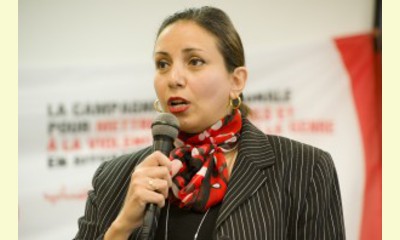|
|
16 Days of Activism: Meet Hania Moheeb, Egypt
un article par Nobel Women's Initiative
Video: Hania Moheeb
Each year since 1991, tens of thousands of
activists from around the world have taken part in
the 16 Days of Activism Against Gender Violence
Campaign. The campaign’s central messages –
women’s rights are human rights and violence
against women constitutes a violation of human
rights – have been a rallying call of the women’s
movement. For these 16 days, Nobel Women’s
Initiative is spotlighting stories about women
activists around the globe.

Hania Moheeb
click on photo to enlarge
Hania Moheeb is a seasoned journalist dedicated to
ending rape and impunity for sexual violence in
Egypt. Hania is herself a survivor of a brutal
politically-motivated sexual assault—an experience
that catapulted her into the role of outspoken
activist.
In January 2013, on the second anniversary of
Egypt’s revolution, Hania attended a demonstration
in Tahrir Square along with thousands of other
Egyptians. Hania was protesting against worsening
oppression and gender-based discrimination at the
hands of the conservative Muslim Brotherhood
government. Her demands for peace were met with
violence. A group of men surrounded Hania and
proceeded to violate her body in a horrific and
well-planned attack that prevented bystanders from
intervening. On that night, 19 similar incidents
of sexual assault were reported from Tahrir
Square. Hania survived, and vowed to seek justice
for herself and the countless other women
experiencing gender violence in Egypt.
The use of politically-motivated sexual assault
against women has gained momentum since the Muslim
Brotherhood came to power. Groups of perpetrators
systematically attack women participating in
public political arenas, such as protests or
demonstrations. The acute coordination and pattern
of the attacks strongly indicates that they are
pre-planned, with the intent to instill fear in
women who exercise their political rights.
Politicians and the regime have remained silent
about the attacks.
Despite the growing risks against outspoken women
in Egypt, Hania continues to challenge her
country’s deep-rooted patriarchal attitudes. She
refuses to be silent about her attack, and has
even gone on national television in Egypt to tell
her story. Hania looks to the experiences of past
female activists in Egypt and draws her strength
from their unbreakable determination and hope for
a better future.
[Note: Thank you to Janet Hudgins, the CPNN reporter
for this article.]
|








|
DISCUSSION
Question(s) liée(s) à cet article:
Where in the world can we find good leadership today?,
* * * * *
Commentaire le plus récent:
Once again, as they have done now each year since 2009, the Nobel Women's Initiative provides biographies of 16 women leaders involved in local action for peace and justice around the world, and in particular to stop violence against women. Last year's biographies were listed in the CPNN discussionboard.

|
|









